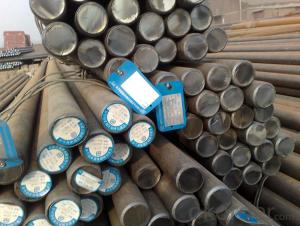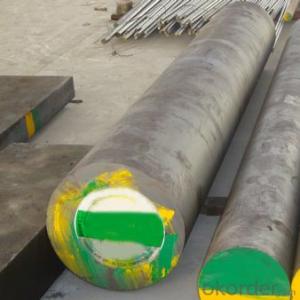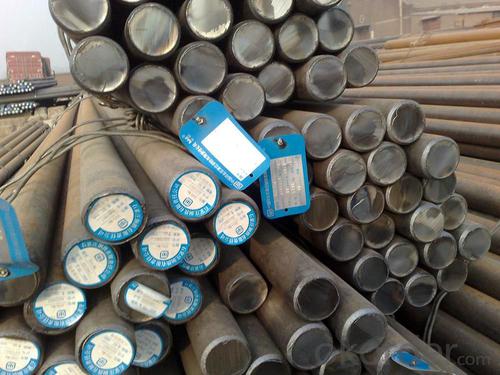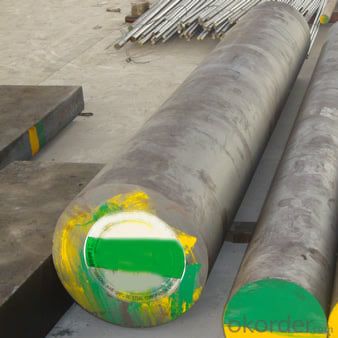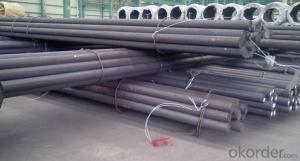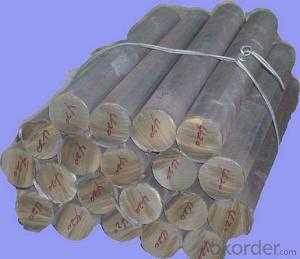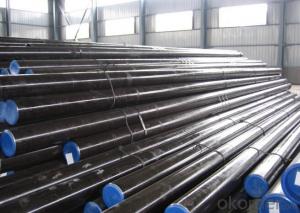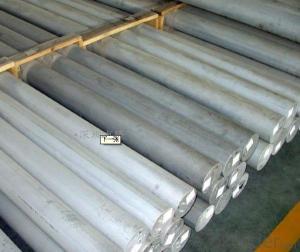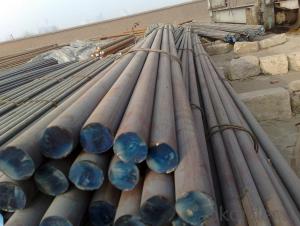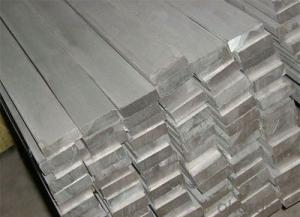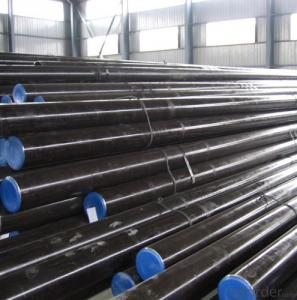Special Steel 5160 Spring Steel Round Bars
- Loading Port:
- China main port
- Payment Terms:
- TT OR LC
- Min Order Qty:
- 25 m.t.
- Supply Capability:
- 10000 m.t./month
OKorder Service Pledge
OKorder Financial Service
You Might Also Like
Specification
The details of our Steel
1. Produce Standard: as the GB, AISI, ASTM, SAE, EN, BS, DIN, JIS Industry Standard
2. Produce processes: Smelt Iron -EAF smelt Billet - ESR smelt Billet -Hot rolled or forged get the steel round bar and plate
3. Heat treatment:
Normalized / Annealed / Quenched+Tempered
4. Quality assurance:
All order we can received Third party inspection, You can let SGS, BV,.. and others test company test and inspect our products before Goods shipping.
Product information
Chemical Composition(%) of forged 5160 bar | ||||||||
Steel Grade | C | Si | Mn | S | P | Cr | Ni | V |
5160 | 0.56-0.61 | 0.15-0.35 | 0.75-1.00 | ≤0.035 | ≤0.040 | 0.70-0.90 | ≤0,35 | - |
Specification(mm) of forged 5160 bar | ||||||||
ROUND BAR: 5-40*2000-4000 PLATE: 50-400*200-810*2000-4000 | ||||||||
Main product
High speed steel | |
AISI | M2,M4,M35,M42,T1 |
DIN | 1.3343,1.3243,1.3247,1.3355 |
JIS | SKH51,SKH54,SKH35,SKH59,SKH2 |
Cold work tool steel | |
AISI | D2,D5,D3,D6,A8,A2,O1 |
DIN | 1.2379,1.2601,1.2080,1.2436,1.2631,1.2363,1.2510,1.2327 |
JIS | SKD10,SKD11,SKD1,SKS3 |
Hot work tool steel | |
AISI | H13,H11,H21 |
DIN | 1.2344,1.2343,1.2367,1.2581,1.2713 |
JIS | SKD61,SKD6,SKD7,SKD5SKT4 |
Plastic mould steel | |
AISI | P20,P20+Ni,420 |
DIN | 1.2311,1.2738,1.2083,1.2316 |
JIS | PDS-3,SUS420J1,SUS420J2 |
Alloy structural seel | |
AISI | 5140,4340,4135,4140 |
DIN | 1.7035,1.6511,1.7220,1.7225 |
JIS | SCr440,SNCM439,SCM435,SCM440 |
Stainless steel | |
AISI | 440C,420,430 |
DIN | 1.4125 |
JIS | SUS440C |
Carbon steel | |
AISI | 1045,1020 |
DIN | 1.1191 |
JIS | S45C, G3101 |
Product show

Workshop show

Shipping
1. FedEx/DHL/UPS/TNT for samples, Door-to-Door;
2. By Air or by Sea for batch goods, for FCL; Airport/ Port receiving;
3. Customers specifying freight forwarders or negotiable shipping methods!
Delivery Time: 3-7 days for samples; 5-25 days for batch goods.
Payment Terms
1.Payment: T/T, L/C, Western Union, MoneyGram,PayPal; 30% deposits; 70% balance before delivery.
2.MOQ: 1pcs
3.Warranty : 3 years
4.Package Informations: 1) EXPORT, In 20 feet (GW 25 ton) or 40 feet Container (GW 25 ton)
2)as customer's requirement
Why choose us?
(1) The leading exporter in China special steel industry.
(2) Large stocks for various sizes, fast delivery date.
(3) Good business relationship with China famous factories.
(4) More than 7 years steel exporting experience.
(5) Good after-sales service guarantee.
- Q: How does special steel contribute to the automotive emission reduction?
- Special steel contributes to automotive emission reduction in several ways. Firstly, it is used in the manufacturing of lightweight components, such as the body and chassis, which helps to reduce the overall weight of the vehicle. This, in turn, improves fuel efficiency and reduces emissions. Additionally, special steel can be used to produce more durable and efficient engine parts, such as pistons and crankshafts, which enhance the overall performance of the engine and reduce emissions. Furthermore, special steel is also utilized in the production of exhaust systems, where its high temperature resistance and corrosion resistance properties help to improve the efficiency of catalytic converters, leading to lower emissions of harmful pollutants. Overall, the use of special steel in the automotive industry plays a crucial role in reducing emissions and promoting environmental sustainability.
- Q: What are the different methods of surface honing for special steel?
- There are several methods of surface honing for special steel, including abrasive honing, superabrasive honing, and diamond honing. Abrasive honing involves using a honing stone with abrasive particles to remove material from the surface of the steel. Superabrasive honing uses a honing tool with diamond or cubic boron nitride particles for more precise and efficient honing. Diamond honing, as the name suggests, utilizes diamond abrasives to achieve a superior surface finish and dimensional accuracy. Each method has its own advantages and suitability for specific applications in surface honing special steel.
- Q: How is special steel used in the oil and gas industry?
- Special steel is used in the oil and gas industry for various applications such as manufacturing drill pipes, casings, and pipelines, as well as components for offshore platforms and equipment. It is highly resistant to corrosion, high temperatures, and extreme pressures, making it suitable for harsh environments and ensuring the integrity and safety of infrastructure in the industry.
- Q: Can special steel be used in the telecommunications equipment manufacturing industry?
- Yes, special steel can be used in the telecommunications equipment manufacturing industry. Special steel, known for its exceptional strength, durability, and resistance to corrosion, can be utilized in the production of various telecommunications equipment such as antennas, satellites, transmission towers, and optical fiber cables. Its properties make it ideal for withstanding harsh environmental conditions, ensuring the longevity and reliability of telecommunications infrastructure.
- Q: How does special steel contribute to improving product quality?
- Special steel contributes to improving product quality in several ways. Firstly, special steel has superior strength and durability compared to ordinary steel, making it less likely to deform or break under stress. This ensures that products made with special steel have a longer lifespan and are more reliable for consumers. Secondly, special steel can be engineered with specific properties such as corrosion resistance, heat resistance, or high hardness, which are essential for certain industries or applications. This allows manufacturers to create products that can withstand harsh environments or demanding conditions, ultimately enhancing product quality. Lastly, special steel can be precision-machined to tight tolerances, enabling the production of complex and intricate components with high precision. This level of accuracy results in better-fitting parts, improved performance, and enhanced overall product quality.
- Q: What are the environmental benefits of using special steel?
- Special steel, also known as stainless steel, offers numerous environmental benefits. Firstly, it is highly durable and long-lasting, resulting in reduced waste and resource consumption over time. Additionally, stainless steel is 100% recyclable, allowing it to be repurposed indefinitely without any loss in quality. This recycling process requires significantly less energy compared to the production of new steel, leading to a considerable reduction in carbon emissions and environmental impact. Moreover, special steel is corrosion-resistant, eliminating the need for frequent replacements and reducing the use of resources and energy associated with maintenance. Overall, the environmental benefits of using special steel include decreased waste generation, lower energy consumption, reduced carbon emissions, and increased resource efficiency.
- Q: How does special steel withstand extreme temperatures?
- Special steel is designed to withstand extreme temperatures due to its unique composition and manufacturing process. It contains a higher percentage of alloying elements, such as chromium, nickel, and molybdenum, which enhance its heat resistance properties. These alloys form a protective layer on the surface of the steel, preventing oxidation and corrosion at high temperatures. Additionally, special steel undergoes specific heat treatment methods, such as quenching and tempering, which further enhance its ability to withstand extreme temperatures without losing its strength and structural integrity.
- Q: How does special steel contribute to the manufacturing of gears?
- Special steel plays a crucial role in the manufacturing of gears as it offers exceptional strength, durability, and wear resistance properties. The use of special steel allows gears to withstand heavy loads, high temperatures, and intense friction, ensuring their longevity and reliable performance. Moreover, the precise metallurgical properties of special steel enable gears to maintain their shape and dimensions accurately, resulting in smooth and efficient power transmission in various industries, including automotive, aerospace, and machinery.
- Q: What are the requirements for special steel used in power generation equipment manufacturing?
- The requirements for special steel used in power generation equipment manufacturing are quite stringent. First and foremost, this type of steel must possess high strength and durability to withstand the extreme operating conditions and loads experienced in power generation equipment. This includes withstanding high temperatures, pressure, and mechanical stress. Additionally, special steel used in power generation equipment must exhibit excellent resistance to corrosion and oxidation. As power generation equipment often operates in harsh environments, such as high humidity or exposure to corrosive substances, the steel must have a high level of resistance to ensure its longevity and performance. Furthermore, the steel used in power generation equipment must have good weldability and formability. This is crucial for the manufacturing process, as complex shapes and structures are often required in power generation equipment, and the ability to weld and form the steel accurately is essential. Another important requirement for special steel in power generation equipment is its ability to maintain its mechanical properties at elevated temperatures. Power generation equipment, such as boilers or turbines, operates at high temperatures, and the steel used must retain its strength, creep resistance, and dimensional stability under these conditions. Lastly, special steel for power generation equipment must conform to industry standards and specifications. These standards ensure the quality, reliability, and safety of the steel used in power generation equipment manufacturing. Compliance with these standards is crucial to ensure the performance and longevity of the equipment. Overall, the requirements for special steel used in power generation equipment manufacturing are demanding, encompassing high strength, durability, resistance to corrosion and oxidation, good weldability and formability, heat resistance, and compliance with industry standards. Meeting these requirements is vital to ensure the efficient and reliable operation of power generation equipment.
- Q: What properties make special steel unique?
- Special steel, also referred to as alloy steel, possesses distinct characteristics that differentiate it from other forms of steel. Firstly, special steel stands out due to its remarkable strength and hardness. It is specifically designed to resist deformation, making it ideal for applications that demand robust materials. Whether in the construction, automotive, or aerospace sectors, special steel provides the necessary durability and reliability. Another noteworthy attribute of special steel is its exceptional ability to resist corrosion. By incorporating certain alloying elements like chromium, nickel, or molybdenum, this type of steel becomes highly resistant to rust and other forms of corrosion. Consequently, special steel finds extensive use in marine environments, chemical plants, and oil and gas industries where exposure to harsh conditions is prevalent. Moreover, special steel displays excellent heat resistance. It can endure high temperatures without compromising its strength or structure, rendering it suitable for use in extreme heat environments such as power generation or furnace components. This property allows special steel to be employed in critical situations where other materials may fail or deteriorate. Special steel is renowned for its versatility and adaptability as well. Through the incorporation of various alloying elements and heat treatment processes, it can be customized to meet the specific requirements of different industries. This flexibility enables the creation of specialized alloys with unique properties, such as enhanced machinability, wear resistance, or improved magnetic properties, catering to a wide range of applications. In conclusion, the exceptional strength and hardness, superior corrosion resistance, excellent heat resistance, and adaptability of special steel make it an invaluable material in numerous industries. It enables the development of innovative and reliable products that meet specific industry needs.
Send your message to us
Special Steel 5160 Spring Steel Round Bars
- Loading Port:
- China main port
- Payment Terms:
- TT OR LC
- Min Order Qty:
- 25 m.t.
- Supply Capability:
- 10000 m.t./month
OKorder Service Pledge
OKorder Financial Service
Similar products
Hot products
Hot Searches
Related keywords
